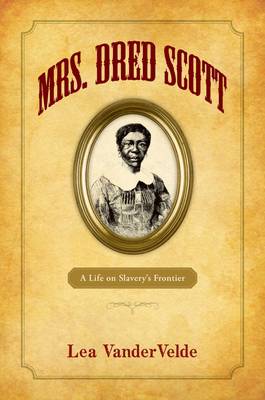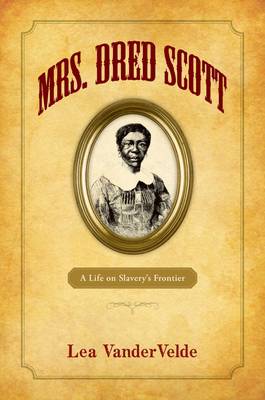
Door een staking bij bpost kan je online bestelling op dit moment iets langer onderweg zijn dan voorzien. Dringend iets nodig? Onze winkels ontvangen jou met open armen!
- Afhalen na 1 uur in een winkel met voorraad
- Gratis thuislevering in België vanaf € 30
- Ruim aanbod met 7 miljoen producten
Door een staking bij bpost kan je online bestelling op dit moment iets langer onderweg zijn dan voorzien. Dringend iets nodig? Onze winkels ontvangen jou met open armen!
- Afhalen na 1 uur in een winkel met voorraad
- Gratis thuislevering in België vanaf € 30
- Ruim aanbod met 7 miljoen producten
Zoeken
€ 77,45
+ 154 punten
Omschrijving
Among the most infamous U.S. Supreme Court decisions is Dred Scott v. Sandford . Despite the case's signal importance as a turning point in America's history, the lives of the slave litigants have receded to the margins of the record, as conventional accounts have focused on the case's judges and lawyers. In telling the life of Harriet, Dred's wife and co-litigant in the case, this book provides a compensatory history to the generations of work that missed key sources only recently brought to light. Moreover, it gives insight into the reasons and ways that slaves used the courts to establish their freedom.
A remarkable piece of historical detective work, Mrs. Dred Scott chronicles Harriet's life from her adolescence on the 1830s Minnesota-Wisconsin frontier, to slavery-era St. Louis, through the eleven years of legal wrangling that ended with the high court's notorious decision. The book not only recovers her story, but also reveals that Harriet may well have been the lynchpin in this pivotal episode in American legal history.
Reconstructing Harriet Scott's life through innovative readings of journals, military records, court dockets, and even frontier store ledgers, VanderVelde offers a stunningly detailed account that is at once a rich portrait of slave life, an engrossing legal drama, and a provocative reassessment of a central event in U.S. constitutional history. More than a biography, the book is a deep social history that freshly illuminates some of the major issues confronting antebellum America, including the status of women, slaves, Free Blacks, and Native Americans.
A remarkable piece of historical detective work, Mrs. Dred Scott chronicles Harriet's life from her adolescence on the 1830s Minnesota-Wisconsin frontier, to slavery-era St. Louis, through the eleven years of legal wrangling that ended with the high court's notorious decision. The book not only recovers her story, but also reveals that Harriet may well have been the lynchpin in this pivotal episode in American legal history.
Reconstructing Harriet Scott's life through innovative readings of journals, military records, court dockets, and even frontier store ledgers, VanderVelde offers a stunningly detailed account that is at once a rich portrait of slave life, an engrossing legal drama, and a provocative reassessment of a central event in U.S. constitutional history. More than a biography, the book is a deep social history that freshly illuminates some of the major issues confronting antebellum America, including the status of women, slaves, Free Blacks, and Native Americans.
Specificaties
Betrokkenen
- Auteur(s):
- Uitgeverij:
Inhoud
- Aantal bladzijden:
- 498
- Taal:
- Engels
Eigenschappen
- Productcode (EAN):
- 9780199754083
- Verschijningsdatum:
- 28/10/2010
- Uitvoering:
- Paperback
- Formaat:
- Trade paperback (VS)
- Afmetingen:
- 150 mm x 226 mm
- Gewicht:
- 635 g

Alleen bij Standaard Boekhandel
+ 154 punten op je klantenkaart van Standaard Boekhandel
Beoordelingen
We publiceren alleen reviews die voldoen aan de voorwaarden voor reviews. Bekijk onze voorwaarden voor reviews.











